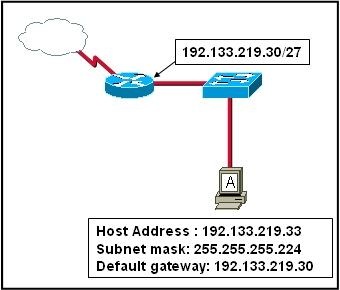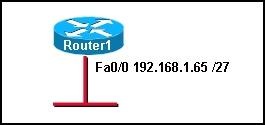• 128
• 254
• 255
• 256
• 512
• 1024
2. Convert the decimal number 231 into its binary equivalent. Select the correct answer from the list below.
• 11110010
• 11011011
• 11110110
• 11100111
• 11100101
• 11101110
3. How many usable hosts are available given a Class C IP address with the default subnet mask?
• 254
• 255
• 256
• 510
• 511
• 512
4. Which statement describes NAT overload or PAT?
• Each internal address is dynamically translated to an individual external IP address.
• A single internal address is always translated to the same unique external IP address.
• Many internal addresses can be translated to a single IP address using different port assignments.
• Many internal addresses are statically assigned a single IP address and port to use for communications.
5. Which IPv4 class of addresses provides the most networks?
• Class A
• Class B
• Class C
• Class D
• Class E
6. Which statement accurately describes public IP addresses?
• Public addresses cannot be used within a private network.
• Public IP addresses must be unique across the entire Internet.
• Public addresses can be duplicated only within a local network.
• Public IP addresses are only required to be unique within the local network.
• Network administrators are free to select any public addresses to use for network devices that access the Internet.
7. Which two statements describe classful IP addresses? (Choose two.)
• It is possible to determine which class an address belongs to by reading the first bit.
• The number of bits used to identify the hosts is fixed by the class of the network.
• Only Class A addresses can be represented by high-order bits 100.
• Up to 24 bits can make up the host portion of a Class C address.
• Up to 24 bits can be used to identify unique networks.
• Three of the five classes of addresses are reserved for multicasts and experimental use.
8. Company XYZ uses a network address of 192.168.4.0. It uses the mask of 255.255.255.224 to create subnets. What is the maximum number of usable hosts in each subnet?
• 6
• 14
• 30
• 62
9. hat is the network broadcast address for a Class C address of 192.168.32.0 with the default subnet mask?
• 192.168.0.0
• 192.168.0.255
• 192.168.32.0
• 192.168.32.254
• 192.168.32.255
10. 
Refer to the exhibit. Host A is connected to the LAN, but it cannot get access to any resources on the Internet. The configuration of the host is shown in the exhibit. What could be the cause of the problem?
• The host subnet mask is incorrect.
• The default gateway is a network address.
• The default gateway is a broadcast address.
• The default gateway is on a different subnet from the host.
11. IPv6 increases the IP address size from 32 bits to how many bits?
• 64
• 96
• 128
• 192
• 256
• 512
12. What is the range of the first octet in a Class B address?
• 127 to 191
• 127 to 192
• 128 to 191
• 128 to 192
13. Which IPv4 class provides the highest number of host addresses per network?
• Class A
• Class B
• Class C
• Class D
• Class E
14. 
refer to the exhibit. Which range of IP addresses would allow hosts that are connected to the Router1 Fa0/0 interface to access outside networks?
• 192.168.1.0 through 192.168.1.95
• 192.168.1.66 through 192.168.1.94
• 192.168.1.66 through 192.168.1.96
• 192.168.1.0 through 192.168.1.127
• 192.168.1.66 through 192.168.1.128
15. Which option shows the proper notation for an IPv6 address?
• 2001,0db8,3c55,0015,abcd,ff13
• 2001-0db8-3c55-0015-abcd-ff13
• 2001.0db8.3c55.0015.abcd.ff13
• 2001:0db8:3c55:0015::abcd:ff13
16. What are two reasons that NAT was developed? (Choose two.)
• to preserve registered public IP addresses
• to allow users on the public Internet to access local networks
• to provide a method for privately addressed LANs to participate in the Internet
• to make routing protocols operate more efficiently
• to allow private addresses to be routed on the public Internet
• to reduce overhead and CPU usage on gateway routers
17. What must happen for a privately addressed host on an inside local network to be able to communicate with an outside destination host on the Internet?
• The host IP address must be translated to an outside private address.
• The host IP address must be translated to an inside local address.
• The host IP address must be translated to an outside local address.
• The host IP address must be translated to an inside global address.
18. Which port numbers are used by PAT to create unique global addresses?
• 255 and below
• 1024 and below
• 1025 and above
• 64,000 and above
19. Static NAT works by mapping a specific inside local IP address to what other specific address type?
• inside global
• outside local
• outside global
• private IP address
20. What are three advantages of NAT implementations? (Choose three.)
• improved security
• improved router performance
• decreased processor load
• improved scalability
• universal application compatibility
• sharing few public IP addresses with many hosts
Tuesday, 30 June 2009
CCNA Discovery 2 Module 4 Exam Answers Version 4.0
CCNA Discovery 2 Module 4 Exam Answers Version 4.0
1. In an 8 bit binary number, what is the total number of combinations of the eight bits? Labels: CCNA-Discovery-2-Version 4.0
Posted by 640-802-ccna at 6/30/2009 06:26:00 am
Loading related posts...
CCNA-Discovery-2-Version 4.0
6/30/2009 06:26:00 am
Subscribe to:
Post Comments (Atom)





0 comments:
Post a Comment